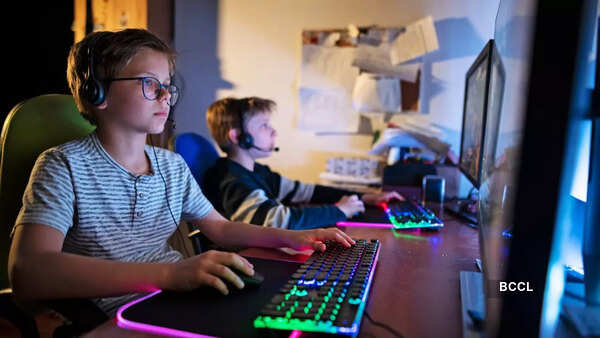How social media affects students – Times of India
A 2016 MIT study found that frequent access to social media led to a 7% increase in severe depression and a 20% increase in anxiety disorders among students.The researchers also discovered that excessive nighttime social media use and emotional investment in social media (getting a sense of validation and belonging predominantly from social media) were linked to poor test scores in various academic criteria and also caused higher levels of anxiety and depression.
The important question that remains is why this habit persists when the harmful effects of extended social media usage are so well documented. The answers lie in neuroscience and the functioning of our brains.

Image: Canva
Social media algorithms stimulate the dopaminergic pleasure pathways of our brains. Dopamine is a chemical produced in our brain that gives feelings of pleasure, satisfaction, and motivation. Social media algorithms stimulate sensations of surprise, reward, and a sense of excitement, all of which trigger dopamine. In many ways, this sets off a reaction in the brain similar to what happens when someone has an addiction to a narcotic substance.
The danger of social media-induced overstimulation of the dopamine pathways is that dopamine also plays a role in controlling memory, mood, sleep, learning, concentration, movement, and other body functions. All of these start suffering due to the fact that the brain starts getting dopamine depleted, and just like any other addiction, the brain needs more and more dopamine just to sustain that high. Research in the Indian Journal of Public Health reveals that students with higher social media engagement tend to experience poorer sleep quality, loss of concentration, and subsequently face academic challenges. Most academicians have observed that students’ ability to focus and remember information is compromised when they often go back and forth between social media use and schoolwork.
How to keep both your brain and blood pressure in check
What can be done to mitigate these effects? Parents need to take the lead here by setting reasonable time limits on daily social media use, encouraging face-to-face contact with friends, monitoring their children’s accounts, and, most importantly, talking to the children about how they are using social media and how it makes them feel. Remind your teens that social media is full of unrealistic images, and there is no point in comparing the inside of their minds with the outside of what others are projecting.
Parents alone can’t solve this societal-level challenge. Regulators and social media companies also have a responsibility. We have reached the epoch where humans aren’t merely shaping technology, but technology is shaping us. It is shaping our social connections, consumption patterns, and even values. Teens, especially, are far more proficient with technology than they are wise. We have already reached the stage where social media algorithms are being run by automated intelligence that reflects our own morality and values. Regulators and social media companies need to be very careful about what our values truly are and ought to be. A failure to do so will have a long-lasting and far-reaching impact on the social structure of humanity.
Authored by: Praneet Mungali – Trustee and Secretary of the Sanskriti Group of Schools, Pune.
function loadGtagEvents(isGoogleCampaignActive) { if (!isGoogleCampaignActive) { return; } var id = document.getElementById('toi-plus-google-campaign'); if (id) { return; } (function(f, b, e, v, n, t, s) { t = b.createElement(e); t.async = !0; t.defer = !0; t.src = v; t.id = 'toi-plus-google-campaign'; s = b.getElementsByTagName(e)[0]; s.parentNode.insertBefore(t, s); })(f, b, e, 'https://www.googletagmanager.com/gtag/js?id=AW-877820074', n, t, s); };
function loadSurvicateJs(allowedSurvicateSections = []){ const section = window.location.pathname.split('/')[1] const isHomePageAllowed = window.location.pathname === '/' && allowedSurvicateSections.includes('homepage')
if(allowedSurvicateSections.includes(section) || isHomePageAllowed){ (function(w) { var s = document.createElement('script'); s.src="https://survey.survicate.com/workspaces/0be6ae9845d14a7c8ff08a7a00bd9b21/web_surveys.js"; s.async = true; var e = document.getElementsByTagName('script')[0]; e.parentNode.insertBefore(s, e); })(window); }
}
window.TimesApps = window.TimesApps || {}; var TimesApps = window.TimesApps; TimesApps.toiPlusEvents = function(config) { var isConfigAvailable = "toiplus_site_settings" in f && "isFBCampaignActive" in f.toiplus_site_settings && "isGoogleCampaignActive" in f.toiplus_site_settings; var isPrimeUser = window.isPrime; if (isConfigAvailable && !isPrimeUser) { loadGtagEvents(f.toiplus_site_settings.isGoogleCampaignActive); loadFBEvents(f.toiplus_site_settings.isFBCampaignActive); loadSurvicateJs(f.toiplus_site_settings.allowedSurvicateSections); } else { var JarvisUrl="https://jarvis.indiatimes.com/v1/feeds/toi_plus/site_settings/643526e21443833f0c454615?db_env=published"; window.getFromClient(JarvisUrl, function(config){ if (config) { loadGtagEvents(config?.isGoogleCampaignActive); loadFBEvents(config?.isFBCampaignActive); loadSurvicateJs(config?.allowedSurvicateSections); } }) } }; })( window, document, 'script', );
For all the latest lifestyle News Click Here

